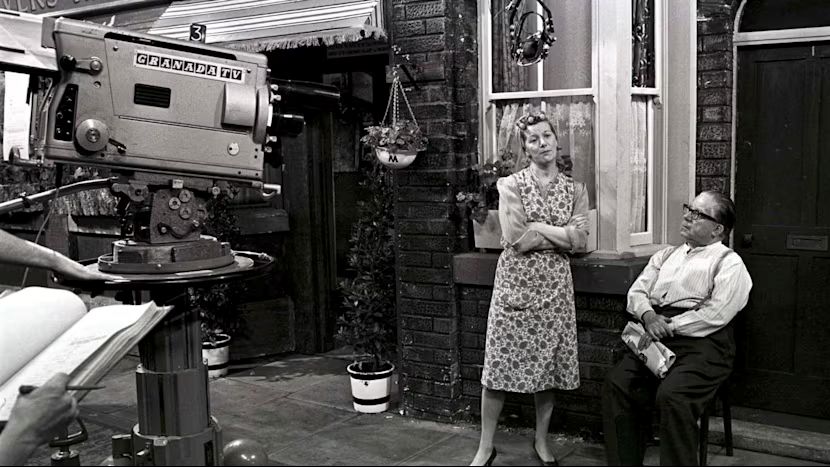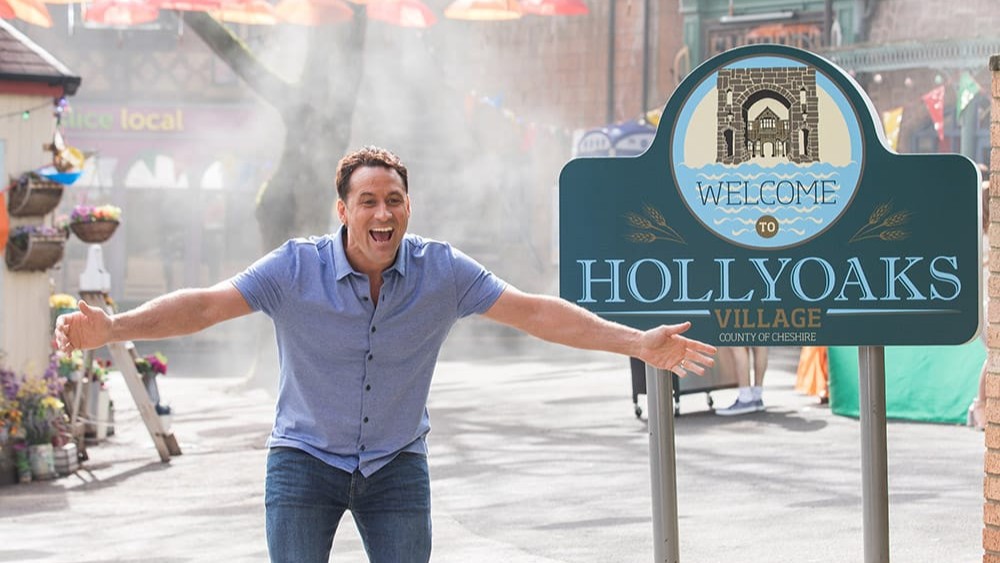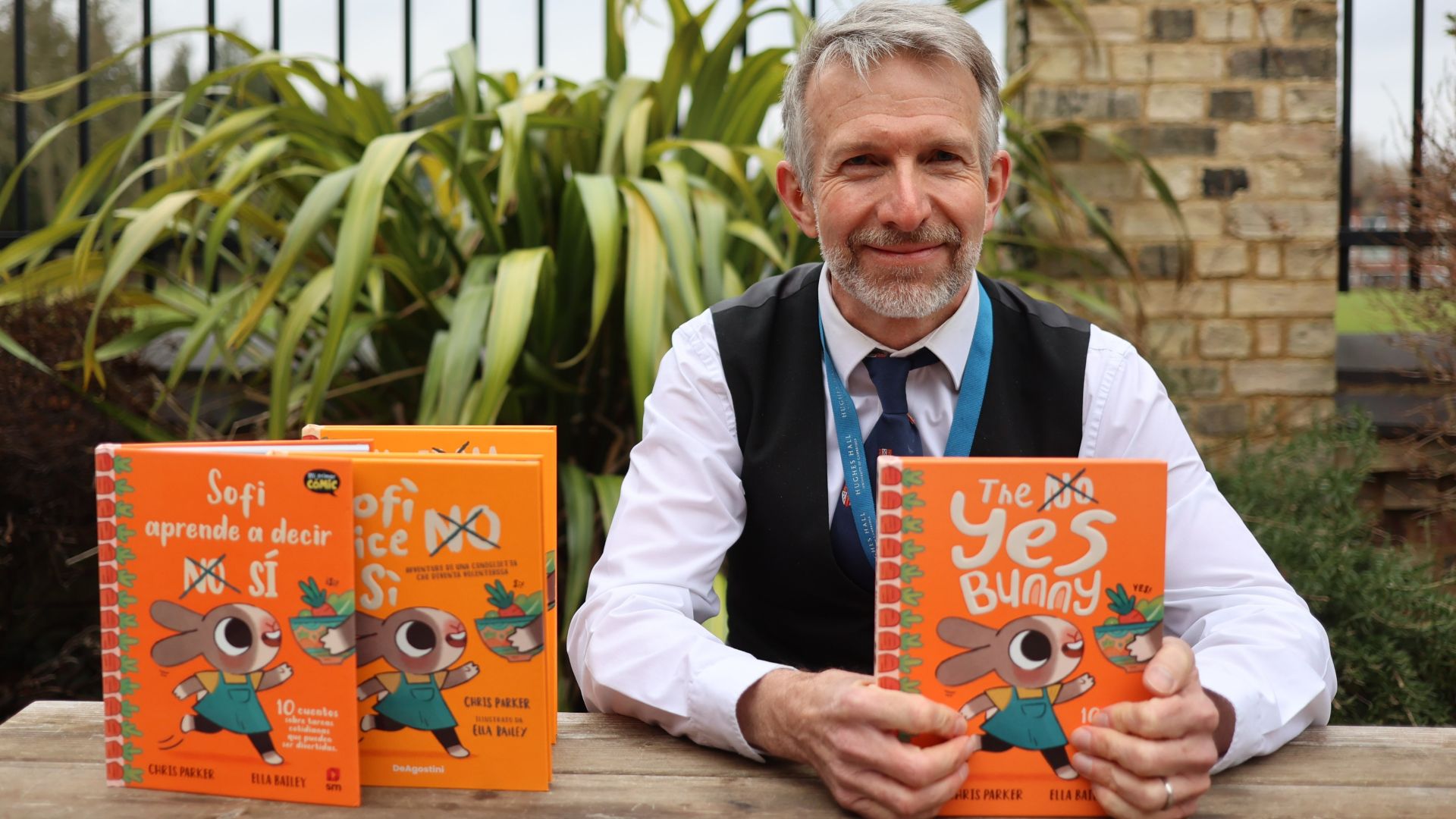Alumnus Chris Parker (SE 1988) has spent his career writing for some of the most familiar voices on British television – from Coronation Street and EastEnders to Peppa Pig. We asked him what it’s like to write for characters who are already household names and, in an industry where budgets are tightening and AI tools are on the rise, what the future holds for the television writer.

Coronation Street creator Tony Warren spent his early childhood hiding under the dining room table, eavesdropping on his mother and her friends, soaking up their stories, their attitudes, their turns of phrase. He turned these into the world’s longest running drama, driven by the desire to capture a world that was fast disappearing — terraces falling to the wrecking ball in the name of slum clearance, to be replaced by high-rise ‘streets in the sky’. Ken Barlow, Elsie Tanner, Ena Sharples and the riveting backstreet universe that revolved around them entranced millions of viewers.
It’s sobering to look back at this 1960 launch — the television drama equivalent of the Big Bang — from the vantage point of 2025. With production budgets slashed for all but the few shows with a guaranteed global audience, TV fiction faces profound questions about its ability to reflect the world of its audience — and what role actual human writers will play in its production. Within a year or two, will the eavesdropper under the table be the latest generation AI tool?
Tony Warren passed the Coronation Street writing baton to generations of under-the table-lurkers who grew up eavesdropping on the show itself. Fast-forward several decades and one of them was me. The show had always been admired by its devotees for being ‘true to life’ and we writers dutifully strip-mined our memories and day-to-day lives for material as we raced to fuel this relentless juggernaut. But the writer’s number one responsibility was to step convincingly into every character’s shoes — to inhabit their voice so that it felt true to everything they had said up to that moment. No pressure!
“Testing times,” murmured one of the old guard writers, trying to unnerve this rookie as I prepared to turn in my first episode. And he wasn’t wrong. I’d spent so many hours of my life absorbing these voices, I could feel them in my bones, and yet… Was my Ken Barlow Ken enough? Was he, in fact, too Ken — a parody of himself? Add long-suffering wife Deirdre to the mix and the possibilities for a mis-step increased exponentially. And that was before they’d taken a trip to the Rovers. I’d cut my writing teeth on five years’ worth of teenage antics on Hollyoaks, but no amount of snogging and illicit cider-swigging could prepare me for my first visit to Rita and Norris in the Kabin, or the ins-and-outs of staging dialogue amid the whirr of sewing machines in the Underworld underwear factory.

Every character, it seemed, spoke in their own language, unique as a fingerprint. Only by attempting to write in those voices could the code, eventually, be cracked, and the characters could begin to live convincingly on the page and screen. And there’s something both magical and terrifying about seeing characters you’ve watched for years begin to speak dialogue you’ve written, a little like John Travolta and Uma Thurman pulling you up to join them on Jack Rabbit Slim’s dancefloor in Pulp Fiction.
I created my own piece of Coronation Street history, inventing the long-surviving character Chesney Brown, brought to life by the brilliant Sam Aston, which feels like having sewn a stitch on the Bayeux Tapestry. I moved on to write for EastEnders and, when my children were born, I began to write for shows that they could enjoy, beginning with Peppa Pig, where I had to think my way into the skin of Daddy Pig and Madame Gazelle. Later, on Postman Pat, I wrote Pat’s first (and possibly last) delivery trip with a jet pack, while trying to nail the unique speech patterns of postmistress Mrs Goggins.
I’ve since gone on to write hundreds of episodes of animated shows ranging from Netflix’s Chip and Potato to Milo, Bing, Happy Town, Numberblocks, Timmy Time and Clangers. For me, there’s something uniquely wonderful about television — the fact that it’s there, all the time, in your living room. The fact that it’s our shared culture, and our memories of it weave their way through our whole lives. I love the fact that we take it for granted, like family and fresh water in the tap — like all the things that matter most to us. But also I worry that we won’t know what we had until it’s gone.

On any long-running show, the balancing act is to keep familiar voices fresh and unexpected while sounding exactly like themselves — a ‘same but different’ sweet spot that also goes for the kinds of stories shows prefer. With that in mind, it wouldn’t require an outrageous plot twist to have show producers use AI tools to produce story outlines or even dialogue that mimics the speech patterns of well-known characters.
Much of the concern around AI has focused, rightly, on developers using writers’ work without permission and infringing copyright. But there are other, perhaps equally pressing, reasons to be concerned. Remember all those social media posts when ChatGPT first appeared, where people would ask it to write, say, a passive-aggressive memo about keeping the workplace fridge tidy in the style of a Shakespeare sonnet? What’s to stop a drama series tapping in a few prompts and using AI to churn out story suggestions and even dialogue, based upon the vast amount of “learning” material readily available?
Most writers begin a script by producing a ‘draft zero’ — a very rough early draft which is shared with no-one, but which is a crucial stepping stone between the blank page and the first draft that lands in the script editor’s inbox. It’s beginning to feel very possible that these draft zeros — lumpy, imperfect, but bearing the DNA of what ends up on the screen — could be routinely AI generated, with vast implications for the role of the writer.
According to the Writers’ Guild of Great Britain’s (WGGB) policy position statement, “While the AI systems are not yet sophisticated enough to produce works which accurately mimic the standard of writing produced by professional writers, this is a likely future scenario.” It quotes a report by KPMG, Generative AI and the UK Labour Market, which estimates that 43% of the tasks associated with authors, writers and translators could be automated, with humans ‘fine tuning’ machine output.

“Writers could be brought onto a project to ‘polish’ scripts written by AI tools rather than develop original work themselves and be paid less as a consequence,” the WGGB claims. And this is the scenario that keeps so many writers, insomniac at the best of times, awake at night — the idea that AI is whispering its promises of cost-cutting at the very moment when the industry has reached crunch point.
A post-Covid boom in programme-making created a glut of shows, some of which are still on shelves waiting to be aired years after completion. Investors want streamers to focus on profitability, not simply expansion of the subscriber base. The result has been a dramatic contraction in global production which began in 2023 and has gathered momentum ever since. UK creative industries union Bectu has found that over half of the country’s film and TV workers are not currently able to find work in the industry.
Writers can come across as Luddite in their approach to AI, but privately most understand that it has value as a brainstorming tool — something to bounce ideas off, at a time when writers have less and less opportunity to come face-to-face in meetings or to lock horns in that semi-mythical and highly-endangered space, the writers’ room.
I have to stress that every producer I’ve worked with has, without exception, placed a very high value on the role of the writer, and has treated me with respect. I’m not aware of any shows using generative AI to produce story outlines or scripts — yet. But as pressure on budgets increases and new, more powerful versions of AI are released, I think it’s inevitable that some will experiment with a view to eliminating the writer as an expense.
The monochrome world of 1960 sometimes feels unimaginably distant. But Ken Barlow still crosses the cobbles to fetch his Weatherfield Gazette, watched by millions. It would be heartening to think that today’s kids, pretending to be engrossed by Roblox while secretly dissecting the foibles of the adults around them, will find there’s still a place to tell their stories when they get the urge to capture the way we live.

